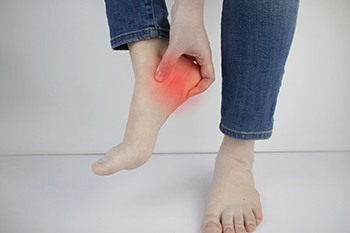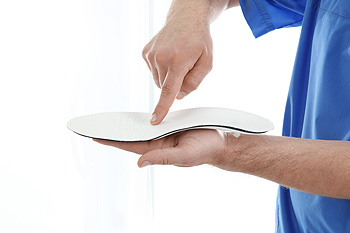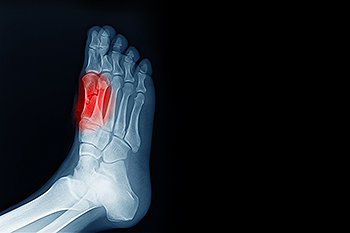

Plantar fasciitis is a prevalent foot condition characterized by inflammation of the plantar fascia, a thick band of tissue that runs along the bottom of your foot, connecting your heel to your toes. This vital ligament supports the arch of your foot and plays a significant role in daily activities. When it becomes inflamed, it can cause excruciating pain, typically described as a stabbing sensation in the heel or along the arch. The good news is that plantar fasciitis is treatable. Resting the affected foot and performing stretching exercises may help to alleviate the pain and reduce inflammation. Wearing supportive footwear and arch supports are essential for providing comfort and reducing strain. While surgery is rarely necessary, it may be considered when all other treatments fail. By seeking proper treatment for plantar fasciitis, patients can take steps toward finding relief and restoring pain-free mobility to their daily life. If you have developed plantar fasciitis, it is strongly suggested that you schedule an appointment with a podiatrist who can effectively diagnose and treat this condition.
Plantar fasciitis can be very painful and inconvenient. If you are experiencing heel pain or symptoms of plantar fasciitis, contact Dr. Harris L. Klear from Burlington County Podiatry Associates. Our doctor can provide the care you need to keep you pain-free and on your feet.
What Is Plantar Fasciitis?
Plantar fasciitis is the inflammation of the thick band of tissue that runs along the bottom of your foot, known as the plantar fascia, and causes mild to severe heel pain.
What Causes Plantar Fasciitis?
How Can It Be Treated?
While very treatable, plantar fasciitis is definitely not something that should be ignored. Especially in severe cases, speaking to your doctor right away is highly recommended to avoid complications and severe heel pain. Your podiatrist can work with you to provide the appropriate treatment options tailored to your condition.
If you have any questions please feel free to contact one of our offices located in Marlton and Delran, NJ . We offer the newest diagnostic and treatment technologies for all your foot and ankle needs.

Orthotics are custom-made shoe inserts designed to support and align your feet properly. They can be a game-changer when it comes to reducing foot pain and discomfort. First, custom orthotics provide added cushioning and support to your feet, which can help distribute your body weight evenly. This can alleviate pressure on specific areas, such as the arches or heels, and reduce pain associated with conditions like plantar fasciitis or flat feet. Second, custom orthotics can correct abnormal foot mechanics, such as overpronation, which is rolling your feet inward, or supination, which is rolling your feet outward. Orthotics also can help to align your feet and ankles properly and reduce strain on the muscles and tendons. In addition, orthotics can improve your posture and reduce the stress on your knees, hips, and lower back. This process can indirectly alleviate foot pain caused by poor alignment. If you're experiencing discomfort or pain in your feet, it is suggested that you make an appointment with a podiatrist to determine the type of custom orthotics you may need.
If you are having discomfort in your feet and would like to try orthotics, contact Dr. Harris L. Klear from Burlington County Podiatry Associates. Our doctor can provide the care you need to keep you pain-free and on your feet.
What Are Orthotics?
Orthotics are inserts you can place into your shoes to help with a variety of foot problems such as flat feet or foot pain. Orthotics provide relief and comfort for minor foot and heel pain but can’t correct serious biomechanical problems in your feet.
Over-the-Counter Inserts
Orthotics come in a wide variety of over-the-counter inserts that are used to treat foot pain, heel pain, and minor problems. For example, arch supports can be inserted into your shoes to help correct overarched or flat feet, while gel insoles are often used because they provide comfort and relief from foot and heel pain by alleviating pressure.
Prescription Orthotics
If over-the-counter inserts don’t work for you or if you have a more severe foot concern, it is possible to have your podiatrist prescribe custom orthotics. These high-quality inserts are designed to treat problems such as abnormal motion, plantar fasciitis, and severe forms of heel pain. They can even be used to help patients suffering from diabetes by treating foot ulcers and painful calluses and are usually molded to your feet individually, which allows them to provide full support and comfort.
If you are experiencing minor to severe foot or heel pain, it’s recommended to speak with your podiatrist about the possibilities of using orthotics. A podiatrist can determine which type of orthotic is right for you and allow you to take the first steps towards being pain-free.
If you have any questions please contact one of our offices located in Marlton and Delran, NJ . We offer the newest diagnostic and treatment technologies for all your foot and ankle needs.

Sesamoiditis is a condition that affects a pair of tiny bones called the sesamoids, found within the tendons beneath the base of the big toe. These bones act as natural shock absorbers, supporting the foot's weight-bearing function. When these bones become inflamed due to excessive pressure, overuse, or trauma, it results in sesamoiditis. The most common cause of sesamoiditis is repetitive stress on the foot, often associated with activities that can include dancing, running, or wearing high heels. Treatment for sesamoiditis typically involves rest and elevation to reduce inflammation. Wearing cushioned footwear and orthotics can alleviate pressure on the sesamoids. In severe cases, a podiatrist may recommend immobilization or corticosteroid injections. Surgery is rarely necessary but may be considered in extreme cases where conservative treatments are ineffective. Early diagnosis and intervention are essential to manage sesamoiditis and prevent chronic pain and complications. If you have developed sesamoiditis, it is strongly suggested that you visit a podiatrist who can effectively treat this condition.
Sesamoiditis is an unpleasant foot condition characterized by pain in the balls of the feet. If you think you’re struggling with sesamoiditis, contact Dr. Harris L. Klear of Burlington County Podiatry Associates. Our doctor will treat your condition thoroughly and effectively.
Sesamoiditis
Sesamoiditis is a condition of the foot that affects the ball of the foot. It is more common in younger people than it is in older people. It can also occur with people who have begun a new exercise program, since their bodies are adjusting to the new physical regimen. Pain may also be caused by the inflammation of tendons surrounding the bones. It is important to seek treatment in its early stages because if you ignore the pain, this condition can lead to more serious problems such as severe irritation and bone fractures.
Causes of Sesamoiditis
Treatment for sesamoiditis is non-invasive and simple. Doctors may recommend a strict rest period where the patient forgoes most physical activity. This will help give the patient time to heal their feet through limited activity. For serious cases, it is best to speak with your doctor to determine a treatment option that will help your specific needs.
If you have any questions please feel free to contact one of our offices located in Marlton and Delran, NJ . We offer the newest diagnostic and treatment technologies for all your foot and ankle needs.

As temperatures rise, flip-flops emerge as the popular choice of footwear for casual comfort. Yet, their popularity sparks an ongoing debate regarding their merits and drawbacks. On the plus side, flip-flops are incredibly easy to slip on, making them perfect for quick outings or beach days. Their open design keeps feet cool, preventing sweat accumulation. However, this very feature can lead to issues. The lack of arch support and cushioning may result in foot pain or strain during extended wear. Flip flops provide minimal protection, possibly making feet vulnerable to injuries. Additionally, there is often a different walking gait, which can affect posture and stability. While flip flops offer undeniable convenience, it is crucial to balance their benefits with potential drawbacks, choosing them for appropriate situations while prioritizing foot health. If you would like to have more information about the pros and cons of wearing flip-flops, it is suggested that you speak with a podiatrist who can offer you valuable knowledge.
Flip-flops are not always the best choice of footwear. If you have any concerns about your feet or ankles, contact Dr. Harris L. Klear from Burlington County Podiatry Associates. Our doctor will assist you with all of your foot and ankle needs.
Flip-Flops and Feet
When the weather starts warming up, people enjoy wearing flip-flops. Flip-flops are comfortable, stylish, and easy to slip on and off; they're perfect for any summer beach goer. However, these shoes can cause harm to the feet.
How Can Flip-Flops Affect Me Long-Term?
Are There Injuries Associated with Flip-Flops?
Yes. Since flip-flops are relatively weak and do not provide the same amount of support as sneakers, people who wear flip-flops regularly are more susceptible to injuries. On top of that, the open nature of the shoe makes your feet more prone to other problems, such as cuts and even infections. Common injuries and ailments include:
I like Wearing Flip-Flops. Are There Safe Alternatives?
When buying flip-flops, try to find ones that have sturdy soles and that are made of high-quality materials that will support for your feet. These flip-flops will cost more but will also last longer as a result.
If you have any questions please feel free to contact one of our offices located in Marlton and Delran, NJ . We offer the newest diagnostic and treatment technologies for all your foot and ankle needs.